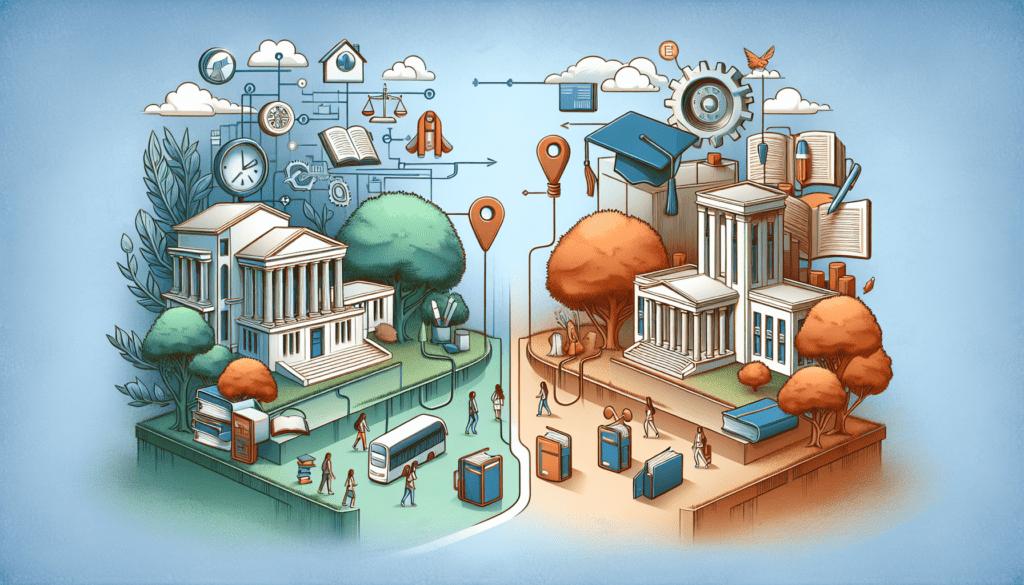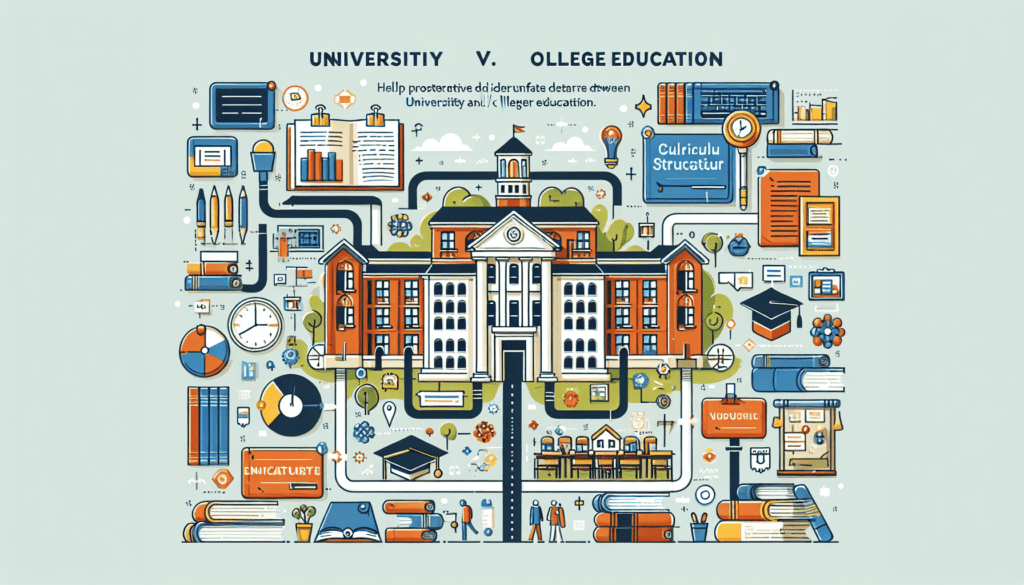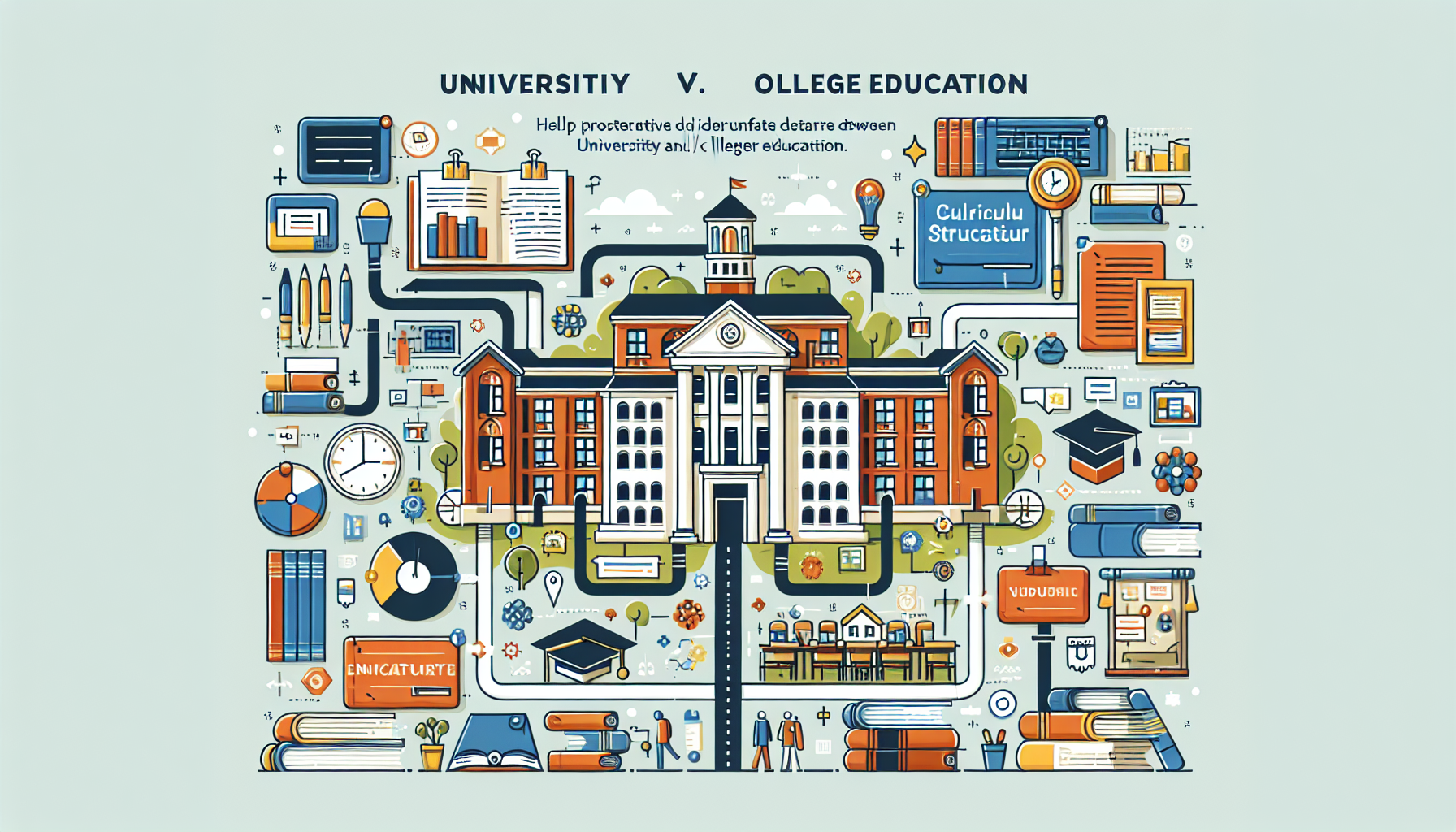Hey there! Have you ever wondered what sets university apart from college? Well, let’s break it down! While the terms “university” and “college” are often used interchangeably, they actually have some distinct differences. University usually refers to a larger institution that offers a broad range of academic programs, including undergraduate and graduate degrees. On the other hand, college tends to be more focused on undergraduate programs and may offer fewer degree options. So, whether you’re a prospective student or just curious, this article will explore the unique characteristics that make university and college different from each other. Let’s get started!

Curriculum
When it comes to the curriculum, there are two primary considerations: structured vs. flexible and depth vs. breadth. In college, the curriculum tends to be more structured, with specific courses and requirements that must be fulfilled in order to graduate. This structured approach provides students with a clear path to follow and ensures that they receive a well-rounded education in various disciplines.
On the other hand, universities often offer more flexibility in terms of course selection. While there are still core requirements, students generally have more room to choose courses that align with their interests and career goals. This flexibility allows for a more personalized learning experience, enabling you to explore different areas of study and tailor your education to your specific needs.
In terms of depth vs. breadth, college curricula often focus on providing a broad knowledge base across multiple subjects. This breadth of subjects allows students to gain a general understanding of various fields, but it may not delve as deeply into any one subject. Universities, on the other hand, tend to offer more specialized and in-depth courses, allowing students to develop a deeper knowledge and expertise in their chosen field of study.
Degree Programs
Degree programs differ between colleges and universities, with colleges typically offering bachelor’s degrees, and universities offering a wider range of programs including bachelor’s, master’s, and doctorate degrees. Bachelor’s degrees are the most common undergraduate degrees, available at both colleges and universities, and typically take four years to complete.
Master’s and doctorate programs, on the other hand, are generally only offered at universities. These advanced degrees provide students the opportunity to specialize and conduct in-depth research in their chosen field. Master’s programs typically take one to two years to complete, while doctoral programs can take several years and involve a significant research component.
In addition to these traditional degree programs, colleges often offer associate’s degrees and certificate programs. Associate’s degrees generally take two years to complete and provide students with a foundation in a specific field. Certificate programs, on the other hand, are shorter in duration and focus on developing specific skills for a particular profession.
Class Sizes
Classroom sizes can vary significantly between colleges and universities. In colleges, you are more likely to find larger classrooms, with lectures and discussions attended by a larger number of students. This can create a different learning dynamic, with less individualized attention from professors.
In contrast, universities may offer smaller classrooms, especially in upper-level courses or specialized programs. These smaller class sizes allow for more interaction between students and professors, fostering a closer academic community. The smaller classroom environment also allows for more personalized attention, with professors able to give individualized feedback and support.
Classroom Environment
In terms of the classroom environment, there are two main approaches: independent learning and structured learning. In college, independent learning is often emphasized, with students expected to take more responsibility for their own education. This means managing your own time, completing assignments independently, and conducting self-directed research.
Universities, on the other hand, tend to offer a more structured learning environment. While independent learning is still important, there may be more guidance and structure provided through scheduled assignments, group projects, and more hands-on learning opportunities. This can be particularly beneficial for students who prefer a more guided approach to their education.

Course Flexibility
Course flexibility is an important consideration when choosing between college and university. In college, the course offerings may be more limited, with a focus on fulfilling specific requirements. Although students have some flexibility in selecting elective courses, the overall course options are often narrower compared to universities.
Universities, on the other hand, tend to offer a wider range of course offerings. This allows you to explore different areas of interest, tailor your studies to your career goals, and potentially take advantage of interdisciplinary programs. The broader range of courses provides ample opportunities to delve into subjects beyond the core requirements, enabling a more customizable educational experience.
Educational Approach
The educational approach can vary between college and university, with a distinction between theoretical knowledge and practical application. In college, there is often a stronger emphasis on theoretical knowledge, providing a foundation in key concepts and theories within a discipline. This theoretical approach allows for a deeper understanding of fundamental principles and theories.
Universities, on the other hand, often prioritize the practical application of knowledge. This means there is a focus on how to apply theoretical concepts to real-world situations and practical problem-solving. The emphasis on practical application allows students to develop skills that are directly applicable to their future careers and prepares them for the challenges of the professional world.
Academic Rigor
Academic rigor can vary between college and university, with differences in academic standards. In college, there is typically a consistent set of academic standards across the institution. This ensures that all students meet a certain level of academic excellence and have a similar educational experience.
In contrast, universities may have varied academic standards depending on the department or program. Some programs may have higher academic standards, offering more rigorous coursework and expectations. This variation in academic rigor allows students to choose a program that aligns with their academic abilities and aspirations, and provides opportunities for challenge and growth.
Academic Support Services
Academic support services are an important consideration for students, and colleges and universities differ in the support they provide. In college, faculty office hours are often available, allowing students to meet with professors outside of class to ask questions or seek guidance. This one-on-one interaction with professors can be valuable for clarifying concepts or exploring further areas of interest.
Universities also offer faculty office hours, but they often have additional resources such as tutoring and study resources. Tutoring services can provide assistance and clarification on difficult course material, while study resources such as writing centers or math labs offer support in specific academic areas. These additional support services can be particularly beneficial for students who may need extra help or want to further enhance their learning.
Campus Life
Campus life can vary between colleges and universities, with differences in residential and non-residential communities. In college, many students live on campus, creating a close-knit residential community. Living on campus offers opportunities for socializing, participating in extracurricular activities, and fostering lifelong friendships. It also provides a more immersive college experience.
Universities, on the other hand, often have a mix of residential and non-residential students. While some universities have on-campus housing options, others may have a larger population of commuting students or students who prefer to live off-campus. This can create a more diverse campus community, incorporating a variety of perspectives and experiences.
Career Opportunities
When it comes to career opportunities, both colleges and universities offer different advantages. In college, research opportunities may be more limited, as the focus is often on the broader curriculum. However, colleges can still provide valuable career guidance and support, helping students explore potential career paths and assisting with job placement.
Universities, on the other hand, often offer extensive research opportunities. These research projects can allow you to work closely with faculty members, gain hands-on experience, and contribute to advancements in your field of study. Additionally, universities often have strong connections with industry partners, providing opportunities for internships and networking that can enhance your career prospects.
In conclusion, choosing between college and university involves considering various factors. The curriculum, degree programs, class sizes, classroom environment, course flexibility, educational approach, and academic support services all differ between the two. Campus life and career opportunities also offer unique experiences at each institution. By understanding these distinctions, you can make an informed decision that aligns with your educational goals, personal preferences, and career aspirations.

